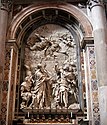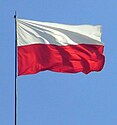Wikipedia:Today's featured list/July 2014
|
Featured list tools: |
July 4
The First Ladies of the United States are the women who have served as the hostesses of the White House. The position is traditionally filled by the wife of the president of the United States, but, on occasion, the title has been applied to women who were not presidents’ wives, such as when the president was a bachelor or widower. Following Barack Obama's first inauguration on January 20, 2009, his wife, Michelle Obama, became the forty-sixth official First Lady. There are five living former First Ladies: Rosalynn Carter, wife of Jimmy Carter; Nancy Reagan, widow of Ronald Reagan; Barbara Bush, wife of George H. W. Bush; Hillary Rodham Clinton, wife of Bill Clinton; and Laura Bush, wife of George W. Bush. The first First Lady was Martha Washington, married to George Washington. The wives of four Presidents died before their husbands were sworn into office but are still considered First Ladies by the White House and National First Ladies' Library: Martha Jefferson, Rachel Jackson, Hannah Van Buren (pictured), and Ellen Lewis Herndon Arthur. (Full list...)
July 7
A shooting thaler is a commemorative coin minted to commemorate one of the Schützenfest or free shooting tournaments held in various cantons within the Swiss Confederation. Most of the designs differ from their circulating counterparts, though the pieces issued for the shooting festivals in Geneva in 1851 and Solothurn in 1855 are exceptions. The first shooting thaler was issued for the Chur shooting festival in 1842 and is denominated at four francs. A total of eighteen designs were struck in the nineteenth century, concluding with the Bern issue of 1885 (pictured). Many nineteenth-century issues were also struck in various other metals besides silver, including gold and white metal, in small quantities. In 1934, a new series began production. This series, however, was cut short due to the outbreak of World War II. Another series of shooting thalers began mintage in 1984. Every year since has seen the mintage of two coins, each bearing the same design, one struck in silver, the other in gold. The only exceptions are the issues of Zürich and Sion in 1999. (Full list...)
July 11
Approximately 100 papal tombs are at least partially extant, representing less than half of the 264 deceased popes. In the first few centuries in particular, little is known of the popes and their tombs, and available information is often contradictory. As with other religious relics, multiple sites claim to house the same tomb. Furthermore, many papal tombs that recycled sarcophagi and other materials from earlier tombs were later recycled for their valuable materials or combined with other monuments. For example, the tomb of Pope Leo I was combined with Leos II, III, and IV circa 855, and then removed in the seventeenth century and placed under his own altar, below Alessandro Algardi's relief, Fuga d'Attila (pictured). The style of papal tombs has evolved considerably throughout history, tracking trends in the development of church monuments. Notable papal tombs have been commissioned from sculptors such as Michelangelo and Gian Lorenzo Bernini. Most extant papal tombs are located in St. Peter's Basilica, other major churches of Rome, or other churches of Italy, France, and Germany. (Full list...)
July 14
The FIFA World Cup finals are the last matches of the FIFA World Cup, an international association football competition established in 1930. The results of the finals determine which men's national team is declared world champions and receives the FIFA World Cup Trophy (pictured). The tournament has been decided by a one-off match on every occasion except 1950, when the tournament winner was decided by a final round-robin group contested by four teams. With five titles, Brazil is the most successful World Cup team and also the only nation to have participated in every World Cup finals tournament. Germany, the current champions, and Italy have four titles each. The other former champions are Uruguay and Argentina with two titles each, and England, France, and Spain with one each. (Full list...)
July 18
A variety of Polish flags are defined in current Polish national law, either through an act of parliament or a ministerial ordinance. Apart from the national flag (pictured), these are mostly military flags, used by one or all branches of the Polish Armed Forces, especially the Polish Navy. Most Polish flags feature white and red, the national colors of Poland. The national colors, officially adopted in 1831, are of heraldic origin and derive from the tinctures of the coats of arms of Poland and Lithuania. Additionally, some flags incorporate the white eagle of the Polish coat of arms, while other flags used by the Armed Forces incorporate military eagles, which are variants. Both variants of the national flag of Poland were officially adopted in 1919, shortly after Poland re-emerged as an independent state in the aftermath of World War I in 1918. Many Polish flags were adopted within the following three years. The stylization of the eagle changed from Neoclassicist to Baroque in 1927. (Full list...)
July 21
Between 1942 and 1978, a total of 22 Australians were decorated with the George Cross (GC), the highest civil decoration for heroism in the United Kingdom and in several countries comprising the Commonwealth of Nations. Fourteen of these medals were awarded directly: nine to military personnel and five to civilians. At the time of the institution of the GC, living recipients of the Empire Gallantry Medal automatically became recipients of the new award, and were required to return their previous medal; two Australians became GC holders through this method. In 1971, when the British Government announced that living recipients of the Albert Medal would be invited to exchange their medals for the GC, six of the 27 Australian holders of the Albert Medal were living and all opted to exchange their insignia for the GC. Australians received the GC under the Imperial honours system until the establishment of the Australian honours system in 1975. One further award of the GC, however, was granted after this date to Constable Michael Kenneth Pratt in 1978. (Full list...)
July 25
E. W. Hornung's writing career lasted from 1887 until his death in 1921. Born in England, Hornung spent two years in Australia for health reasons, and used his Australian experiences as background to a number of novels once he had returned to Britain to begin writing professionally. Hornung had his first work published in 1887—the short story "Stroke of Five" in Belgravia magazine. His first novel, A Bride from the Bush, was published in 1890. In 1899 he published The Amateur Cracksman, a series of short stories about A. J. Raffles (drawing pictured), a gentleman thief in late-Victorian Britain, and his friend Bunny Manders: the two were the criminal counterparts to Sherlock Holmes and Dr. Watson. Hornung dedicated the book to his brother-in-law, the writer Arthur Conan Doyle. Hornung was a prolific writer, completing 21 novels, three editions of poetry and two works of non-fiction, but it is for the character of Raffles that he is best remembered. Hornung's son Oscar was killed at the Second Battle of Ypres in July 1915, which marked the end of Hornung's work in fiction. (Full list...)
July 28
The majority of species in Armillaria, a genus of fungi commonly known as honey mushrooms, are saprotrophic and live mainly on dead wood, but some are parasites that can cause root and butt rot in over 600 species of woody plants. Some Armillaria species, such as A. gallica (pictured), A. mellea, and A. tabescens, are bioluminescent. The genus once served as a wastebasket taxon; due largely to differing interpretations on the limits of the genus, over 270 species and varieties have been placed in Armillaria. A comprehensive 1995 study by Tom Volk and Harold Burdsall evaluated all of the epithets that have been used in Armillaria. They determined that about 40 species belong to Armillaria sensu stricto; the remaining names belong to species that are distributed among 43 other modern fungal genera. Many species are difficult or impossible to distinguish from each other using observable characteristics. (Full list...)







